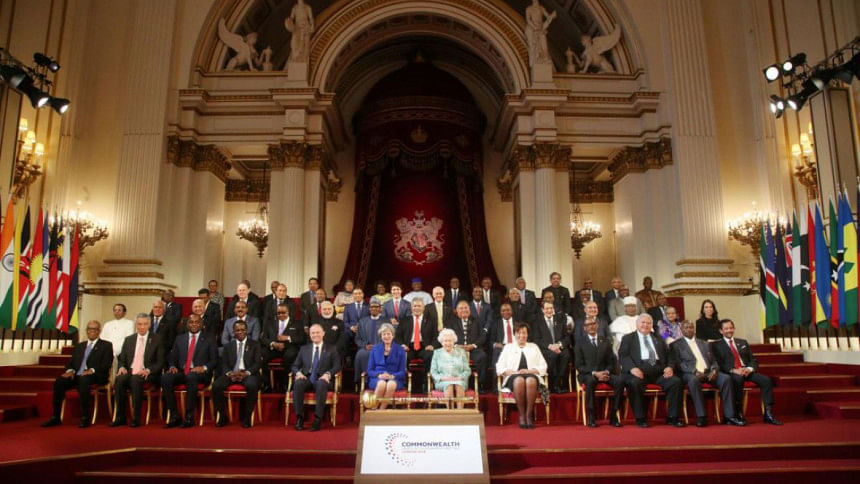Some takeaways from CHOGM

The just concluded 25th Commonwealth Heads of Government Meeting (CHOGM) was important for several reasons. It was hosted by Britain (April 16-20)—Commonwealth's birthplace—at a time when this former colonial power is in search of a new identity. The theme for the summit "Towards a common future" has been chosen as UK is "Brexiting" from the EU; the call for reforms of the organisation has become louder; successor to the head of Commonwealth has been confirmed; and not to overlook the fact that the security situation around the world has become more precarious.
Dwelling on four broad agenda items—prosperity, security, fairness, and sustainability—the summit produced five documents. Apart from the final communiqué the meeting also agreed on four other issues: leaders' statement; Commonwealth Blue Charter; Agenda for Trade and Investment; and Revised Guidelines for Election Observation.
Britain is in the final stages of Brexit negotiations which means that it would lose the vast EU market where 44 percent of British exports used to go (2016). Naturally, Prime Minister Theresa May is looking for new markets for British products. Some Eurosceptics think that Commonwealth countries could probably compensate for the loss of EU. But British exports to Commonwealth countries accounted for only nine percent in 2015. The main hindrance to developing trade across the Commonwealth countries is that the organisation is not a trading bloc and lacks common standard of goods. The communiqué and the Agenda for Trade and Investment actually emphasise the benefits of free international trade and connectivity.
Most leaders attending the summit called for reforms to make the organisation stronger and relevant to meet evolving needs of member states. Unfortunately, it lacks funds and issues that can bring the 53 nations together under a common denominator. The Charter which talks about 16 core values of Commonwealth cannot oblige sovereign members to uphold all the principles. There are several examples of countries deviating from the core values of Commonwealth. It has thus remained a voluntary club of leaders of former British colonies exchanging ideas and experience in the English language—the common bond of Commonwealth.
Queen Elizabeth II, inaugurating the conference, stated that it was her "sincere wish…that one day the Prince of Wales should carry on the important work started by my father in 1949." The Queen, who turned 92 on April 21, indirectly announced that she would not be available to head the organisation and wanted Prince Charles (69) to take on the role. Some members felt that since the position was not hereditary, it should rotate among member states. But the stage was set for Prince Charles who has already visited most of the member countries over the years and the British government presented his candidature as fait accompli as there was no other candidate. Following informal discussions at the retreat, the Leaders' Statement 2018 announced: "The next Head of the Commonwealth shall be His Royal Highness Prince Charles, the Prince of Wales." There are views that without the leadership of the British Royal family, Commonwealth will cease to exist.
The adoption of Commonwealth Blue Charter is innovative as it calls for protecting the ocean, which is the source of all life in the planet. Member states agreed to cooperate with one another in meeting members' ocean commitments through sharing of knowledge, information, expertise and good practices.
The Revised Guidelines on Election Observation will probably make the organisation more relevant as far as democracy in member countries is concerned. Here the role of Commonwealth Ministerial Action Group (CMAG) becomes important as it is this small group which is the decision-maker for the Commonwealth. CMAG has the authority to suspend any errant member which has deviated from the principles of free and fair national elections. The new CMAG consists of Australia, Barbados, Belize, Ghana, Kenya, Namibia, Samoa, South Africa and United Kingdom as the Chair of Commonwealth. The Election Observers Group and CMAG work hand in hand.
For the Bangladesh delegation led by PM Sheikh Hasina, the conference was important for two reasons. First, the final communiqué in paragraph 50 unequivocally expressed full solidarity with Bangladesh affected by the influx of more than a million Rohingya refugees from Myanmar. The heads of member countries called upon Myanmar to halt all violence against the Rohingya people and facilitate their return to their rightful homes in Myanmar under UNHCR supervision. The paragraph also asked Myanmar to ensure necessary conditions for sustainable return of Rohingyas in safety, security and dignity. The leaders also called for action to address the root causes of the crisis and implementation of the Kofi Annan Commission recommendations. The summit commended Bangladesh for providing shelter to the Rohingya community which is facing an existential threat.
The inclusion of such an exhaustive paragraph in the communiqué is indeed rare because it categorically mentions Myanmar as the offender and Bangladesh as the sufferer of Rohingya exodus from Rakhine. The unanimous support of 52 members will strengthen Bangladesh's position on the Rohingya issue at the United Nations and all international forums. Incidentally, Myanmar is not a member of Commonwealth, although it was under British colonial rule until 1948.
The other important event for Bangladesh was PM Sheikh Hasina's meeting with her Indian counterpart PM Narendra Modi. The meeting between the two leaders was set up when Indian Foreign Secretary Vijay Gokhale came to Dhaka on April 8. The two leaders had a "productive" meeting according to the Indian spokesman. Bangladesh's foreign secretary stated that all bilateral issues were discussed. Not surprisingly, there was no meeting between the leaders of India and Pakistan.
Though many say that Commonwealth is a "gossip club", it still has much relevance. A reformed Commonwealth should take up trade and climate change as priority areas of action in addition to human rights and democracy.
Mahmood Hasan is a former ambassador and secretary of the Bangladesh government.






Comments